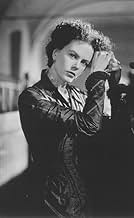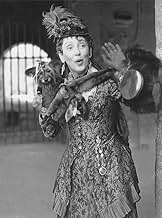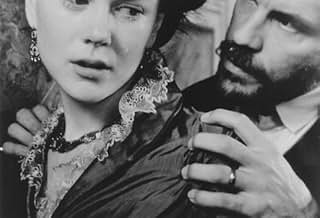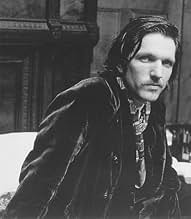NOTE IMDb
6,2/10
13 k
MA NOTE
Une jeune fille américaine hérite d'une fortune. Elle tombe dans une relation malavisée avec un artiste de confiance gentleman, dont la vraie nature acérée et avide transforme sa vie en cauc... Tout lireUne jeune fille américaine hérite d'une fortune. Elle tombe dans une relation malavisée avec un artiste de confiance gentleman, dont la vraie nature acérée et avide transforme sa vie en cauchemar.Une jeune fille américaine hérite d'une fortune. Elle tombe dans une relation malavisée avec un artiste de confiance gentleman, dont la vraie nature acérée et avide transforme sa vie en cauchemar.
- Réalisation
- Scénario
- Casting principal
- Nommé pour 2 Oscars
- 5 victoires et 15 nominations au total
Amy Lindsay
- Miss Molyneux #1
- (as Katie Campbell)
Avis à la une
I vacillate between preferring films that do a simple thing extremely well (Muppet Movie) or those that shoot high and fail. This film is the latter.
Campion has allied her aspirations with `women's' perspectives; honorable and rich enough. And she selects material ripe with possibilities. Clearly she has a vision, presumably extracted from the author's, but she fails to get on top of it.
Part of the problem is the simplification of the book for the screenplay. We just don't get enough foundation for the travesty of person we witness. A large part of the problem is Ms Kidman. She simply doesn't have the depth to pull this off, though she wears the clothes well. We never really see her supposed extraordinary spirit, and never really see how she's trapped by that very same spirit. Malkovich doesn't help. Here, he's too one-dimensionally a schemer.
Campion knows better than to throw in so many irrelevant film-school angles as a substitute for narrative reflection. This film is worth seeing as a study in how a spirited film maker is seduced by that very spirit into the superficialities of style, so is trapped. The ambiguous ending is, I think, Campion's limbo. Let's hope she escapes for her sake as well as ours. We need that spirit.
Campion has allied her aspirations with `women's' perspectives; honorable and rich enough. And she selects material ripe with possibilities. Clearly she has a vision, presumably extracted from the author's, but she fails to get on top of it.
Part of the problem is the simplification of the book for the screenplay. We just don't get enough foundation for the travesty of person we witness. A large part of the problem is Ms Kidman. She simply doesn't have the depth to pull this off, though she wears the clothes well. We never really see her supposed extraordinary spirit, and never really see how she's trapped by that very same spirit. Malkovich doesn't help. Here, he's too one-dimensionally a schemer.
Campion knows better than to throw in so many irrelevant film-school angles as a substitute for narrative reflection. This film is worth seeing as a study in how a spirited film maker is seduced by that very spirit into the superficialities of style, so is trapped. The ambiguous ending is, I think, Campion's limbo. Let's hope she escapes for her sake as well as ours. We need that spirit.
Henry James's "The Portrait of a Lady" stands as one of the greatest psychodramas in literature, a precise and coolheaded dissection of the evolution of a privileged, idealistic if slightly arrogant young woman. This work exemplifies so many qualities which distinguish his view of human nature; he is compassionate, empathetic and observant yet unyielding in exposing the follies, bad judgement and darkness inherent is his characters. No one, especially Isabel Archer, is let off the hook for their misguided choices and her fate is tragic yet completely plausible and, as laid out by James, completely compelling.
A lost opportunity is the best way to describe the film. It is interestingly photographed, full of greys, blues and whites and suggests an almost funereal solemnity in its production design and cinematography. And Nicole Kidman makes a perfect, iridescent Isabel Archer; she looks the part in every respect and certainly conveys the character's intelligence and poignant receptivity to the sights and people around her.
Would that the film had served her better; Jane Campion and the scriptwriter, Laura Jones, eviscerate James's novel but retaining the basic story and structure but put it through the meatgrinder of 90s feminist revisionism. It has been transmogrified into a simplistic tract of victimization and domestic violence, but in doing so Campion and Jones haven't managed to at least raise the story's entertainment value or even create a coherent narrative line for the audience to follow. Rather than present Isabel as a poignant, charismatic figure who unwittingly corrupts her life through bad choices and misguided idealism, the writer and director show us a woman who is victimized by a big bad Man who keeps her locked up in the house, abuses her and steals her money upon duping her into an unhappy marriage. In doing so, James's great work has been drained of its universality and dramatic impact. And while sexual exploitation and gender roles certainly play a part in sealing Isabel's fate in 19th century society, by ignoring the trenchant thematic notions of self determination and the risks of emotional idealism presented by James in his book, we are given a shallow, one-dimensional creation lacking in James's acid edge. Campion cheats a modern audience of discovering filmically a great and still-relevant work by a writer who dared to travel down the darker alleys of a more "civilized" age.
A lost opportunity is the best way to describe the film. It is interestingly photographed, full of greys, blues and whites and suggests an almost funereal solemnity in its production design and cinematography. And Nicole Kidman makes a perfect, iridescent Isabel Archer; she looks the part in every respect and certainly conveys the character's intelligence and poignant receptivity to the sights and people around her.
Would that the film had served her better; Jane Campion and the scriptwriter, Laura Jones, eviscerate James's novel but retaining the basic story and structure but put it through the meatgrinder of 90s feminist revisionism. It has been transmogrified into a simplistic tract of victimization and domestic violence, but in doing so Campion and Jones haven't managed to at least raise the story's entertainment value or even create a coherent narrative line for the audience to follow. Rather than present Isabel as a poignant, charismatic figure who unwittingly corrupts her life through bad choices and misguided idealism, the writer and director show us a woman who is victimized by a big bad Man who keeps her locked up in the house, abuses her and steals her money upon duping her into an unhappy marriage. In doing so, James's great work has been drained of its universality and dramatic impact. And while sexual exploitation and gender roles certainly play a part in sealing Isabel's fate in 19th century society, by ignoring the trenchant thematic notions of self determination and the risks of emotional idealism presented by James in his book, we are given a shallow, one-dimensional creation lacking in James's acid edge. Campion cheats a modern audience of discovering filmically a great and still-relevant work by a writer who dared to travel down the darker alleys of a more "civilized" age.
How can Henry James' novella "Turn Of The Screw" swallow me in whole while I find his other work wordy and arrogant? And how can the same director that has made the two most boring movies I have ever seen, "Two Friends" and this one, also be the same person behind "Sweetie" and "Holy Smoke" - the two finest examples of a movie drawing real characters in real places I have ever seen? This film left me in a state of semi-paralysis.
Being a fan of slow-paced, foreign, and period piece movies, I was pretty surprised at how much this movie bored me. I'm writing this review to try to sort out my feelings of bewilderment.
I think one problem is the use of John Malkovich. We've seen him soar to great heights in the paradoxical "Being John Malkovich" and "The Glass Menagerie", but here his monotone is overly droll and predictable, almost as if he is playing off himself in a Saturday Night Live sketch. In fact the most enjoyable part of this movie was the scene where Mr. Malkovich twirls the umbrella in an ambiguously literal attempt to hypnotize Isabel. If only there were more of these elements in the film....
Then there's Nicole Kidman, whose underachieving attempts at acting has managed to ruin films by not one but two of the greats: Ms. Campion and Stanley Kubrick. Her delivery was similar to Gwyneth Paltrow's in "Mr. Ripley" -- obviously lost. She's just another pretty face thrown into a role of substance after receiving excessive amounts of hype. Watching them act gives me the same feeling I get watching the members of Milli Vanilli try to sing. In their element, they can be undeniably sexy or cute, but in deeper roles the viewer is left completely clueless to their characters' motives. Is Isabel supposed to be docile, alluring, witty, in-control, charismatic, or not-in-control? We can't tell.
In this mess, Barbara Hershey and Martin Donovan as the sickly cousin were both very good. But alongside the weak link Kidman there was little they could do. And Campion made some extremely unusual stylistic sidetracks, the very sidetracks that work in the Holy Smoke India scenes. But in a period piece the fading dream suitors, inexplicable intro, and Chaplin filters seemed inappropriate, although one has to admire her for trying. Even when I don't agree with her methods I respect her sense of adventure (but let's face it, I'll love her forever because of Sweetie). With a little more humility from Campion, a different Isabel, and a more invigorated Malkovich this film might have worked.
For a good treatment of James, try to scare up a copy of the 1961 film The Innocents.
Being a fan of slow-paced, foreign, and period piece movies, I was pretty surprised at how much this movie bored me. I'm writing this review to try to sort out my feelings of bewilderment.
I think one problem is the use of John Malkovich. We've seen him soar to great heights in the paradoxical "Being John Malkovich" and "The Glass Menagerie", but here his monotone is overly droll and predictable, almost as if he is playing off himself in a Saturday Night Live sketch. In fact the most enjoyable part of this movie was the scene where Mr. Malkovich twirls the umbrella in an ambiguously literal attempt to hypnotize Isabel. If only there were more of these elements in the film....
Then there's Nicole Kidman, whose underachieving attempts at acting has managed to ruin films by not one but two of the greats: Ms. Campion and Stanley Kubrick. Her delivery was similar to Gwyneth Paltrow's in "Mr. Ripley" -- obviously lost. She's just another pretty face thrown into a role of substance after receiving excessive amounts of hype. Watching them act gives me the same feeling I get watching the members of Milli Vanilli try to sing. In their element, they can be undeniably sexy or cute, but in deeper roles the viewer is left completely clueless to their characters' motives. Is Isabel supposed to be docile, alluring, witty, in-control, charismatic, or not-in-control? We can't tell.
In this mess, Barbara Hershey and Martin Donovan as the sickly cousin were both very good. But alongside the weak link Kidman there was little they could do. And Campion made some extremely unusual stylistic sidetracks, the very sidetracks that work in the Holy Smoke India scenes. But in a period piece the fading dream suitors, inexplicable intro, and Chaplin filters seemed inappropriate, although one has to admire her for trying. Even when I don't agree with her methods I respect her sense of adventure (but let's face it, I'll love her forever because of Sweetie). With a little more humility from Campion, a different Isabel, and a more invigorated Malkovich this film might have worked.
For a good treatment of James, try to scare up a copy of the 1961 film The Innocents.
Henry James has never struck me as being the most cinematic of authors; his novels generally involve detailed explorations of the psychology of his characters and are marked by a highly elaborate prose style, characterised by lengthy, complex sentences and Latinate vocabulary. Yet a number of films have been based on his works, some of them very successful, dating back to "The Lost Moment" (based on "The Aspern Papers") and "The Heiress" (based on "Washington Square") in the late forties. The Merchant-Ivory team made three film adaptations of his novels, "The Europeans", "The Bostonians" and "The Golden Bowl".
Like many of James's novels, "The Portrait of a Lady" is set among American expatriates in Europe. The central character, Isabel Archer, is a young American woman who becomes financially independent after she inherits a large amount of money from her English uncle Mr Touchett. While travelling on the Continent she meets another American expatriate, Gilbert Osmond, in Florence. The two marry, but the marriage is not a happy one, and Isabel comes to suspect that Osmond is a fortune-hunter whose only interest in her is financial.
The film is made in the "heritage cinema" style, popular in the eighties and nineties, and is reminiscent of the work of Merchant-Ivory and of certain other films of the period, such as Martin Scorsese's "The Age of Innocence" and Terence Davies's "The House of Mirth". Films in this style are generally set in the nineteenth or early twentieth century among the well-to-do classes, are generally based upon a literary source and are characterised by a detailed recreation of the look of the period and by an emphasis on dialogue and character development rather than physical action.
Nicole Kidman's acting career got off to a promising start with films like "Dead Calm" and "Flirting", but over the next ten years or so she seemed to get stuck in something of a rut, appearing in far too many dull or second-rate films like "Far and Away", "Batman Forever", "Practical Magic" and the dreadful "Moulin Rouge". "The Portrait of a Lady" is considerably better than any of those films, but Kidman's performance is not her best, and her accent is not always reliable. It has become commonplace to describe American actors unsuccessfully attempting a British accent (or vice-versa) as being stuck in mid- Atlantic. Kidman's Aussie-tinged American accent is probably the first example of a major stat being linguistically stuck in mid-Pacific.
John Malkovich is a lot better; like his Valmont in another period drama, "Dangerous Liaisons" his Osmond is the sort of character he excels at playing, able to combine an icy reptilian coldness with a certain smooth and plausible charm. There are also good contributions from Barbara Hershey as Osmond's friend and co-conspirator Madame Merle and from John Gielgud in a cameo as the elderly Touchett. (Gielgud was 92 at the time, and this was far from being his last film; he was to continue working up until his death in 2000 at the age of 96).
Although Henry James was a dramatist as well as a novelist, and adapted several of his books for the stage, he considered "The Portrait of a Lady" to be unsuitable for dramatic presentation and dissuaded a friend who wanted to turn it into a play. That, however, did not dissuade Jane Campion from attempting to film the novel. Having recently watched the film for the first time since seeing it in the cinema in 1996, I can say that, in my view, James was probably right. It is, like many examples of "heritage cinema", visually attractive, but it is also rather emotionally cold and too slow-moving. There is nothing much about it which remains in the mind for long afterwards. It does not really compare with the greatest heritage movies like "The Age of Innocence", "The House of Mirth" or the best examples of Merchant-Ivory's work such as "Howard's End". Or, for that matter, with Jane Campion's own earlier, more dramatic and passionate period drama, "The Piano". 6/10
Like many of James's novels, "The Portrait of a Lady" is set among American expatriates in Europe. The central character, Isabel Archer, is a young American woman who becomes financially independent after she inherits a large amount of money from her English uncle Mr Touchett. While travelling on the Continent she meets another American expatriate, Gilbert Osmond, in Florence. The two marry, but the marriage is not a happy one, and Isabel comes to suspect that Osmond is a fortune-hunter whose only interest in her is financial.
The film is made in the "heritage cinema" style, popular in the eighties and nineties, and is reminiscent of the work of Merchant-Ivory and of certain other films of the period, such as Martin Scorsese's "The Age of Innocence" and Terence Davies's "The House of Mirth". Films in this style are generally set in the nineteenth or early twentieth century among the well-to-do classes, are generally based upon a literary source and are characterised by a detailed recreation of the look of the period and by an emphasis on dialogue and character development rather than physical action.
Nicole Kidman's acting career got off to a promising start with films like "Dead Calm" and "Flirting", but over the next ten years or so she seemed to get stuck in something of a rut, appearing in far too many dull or second-rate films like "Far and Away", "Batman Forever", "Practical Magic" and the dreadful "Moulin Rouge". "The Portrait of a Lady" is considerably better than any of those films, but Kidman's performance is not her best, and her accent is not always reliable. It has become commonplace to describe American actors unsuccessfully attempting a British accent (or vice-versa) as being stuck in mid- Atlantic. Kidman's Aussie-tinged American accent is probably the first example of a major stat being linguistically stuck in mid-Pacific.
John Malkovich is a lot better; like his Valmont in another period drama, "Dangerous Liaisons" his Osmond is the sort of character he excels at playing, able to combine an icy reptilian coldness with a certain smooth and plausible charm. There are also good contributions from Barbara Hershey as Osmond's friend and co-conspirator Madame Merle and from John Gielgud in a cameo as the elderly Touchett. (Gielgud was 92 at the time, and this was far from being his last film; he was to continue working up until his death in 2000 at the age of 96).
Although Henry James was a dramatist as well as a novelist, and adapted several of his books for the stage, he considered "The Portrait of a Lady" to be unsuitable for dramatic presentation and dissuaded a friend who wanted to turn it into a play. That, however, did not dissuade Jane Campion from attempting to film the novel. Having recently watched the film for the first time since seeing it in the cinema in 1996, I can say that, in my view, James was probably right. It is, like many examples of "heritage cinema", visually attractive, but it is also rather emotionally cold and too slow-moving. There is nothing much about it which remains in the mind for long afterwards. It does not really compare with the greatest heritage movies like "The Age of Innocence", "The House of Mirth" or the best examples of Merchant-Ivory's work such as "Howard's End". Or, for that matter, with Jane Campion's own earlier, more dramatic and passionate period drama, "The Piano". 6/10
Nominated for two oscars, but neither one was for the leads. a period piece, in 1872. Nicole Kidman is Isabel Archer, who isn't ready to marry, in spite of the proposals from well to do european gentlemen. a galaxy of co-stars - Malkovich, Barbara Hershey, Christian Bale. her friends and family are concerned, even shocked at the opportunities she's passing up. she meets up with Gilbert (Malkovich), and is intrigued by him. what she doesn't know is that he and Madam Serena (Hershey) are toying with her. some similarities to Dangerous Liaisons, also Malkovich!. this one is a little more complicated, since Gilbert's daughter Pansy is also involved. Portrait of a Lady was one of the last films of Shelley Winters. she's the disapproving old aunt, who thinks Isabel is shameful for passing up these chances. also the other Shelley.... Duvall. lot of talking and discussions. much like a jane austen or Bronte Sisters novel. it's pretty good. strategic mind games, as possible romances are considered or denied. the sound is a bit odd. frequently there is an echo from microphone placement... not sure if that was intentional or not. and many scenes are sparsely lit, so sometimes it's confusing to know who's currently talking. Isabel makes her choices, then has to live with them. life lesson there. directed by Jane Campion... won the oscar for The Piano.
Le saviez-vous
- AnecdotesFirst collaboration between director Dame Jane Campion and Nicole Kidman. However, it was Campion who discovered Kidman, where she, at the age of fourteen, was performing at Australian Theater for Young People and subsequently caught the eye of Campion.
- Gaffes(at around 47 mins) A horse carriage is passing through the shot from right to left. The crew with dolly-cam and equipment is clearly visible.
- Citations
Ralph Touchett: I love you but without hope.
- Crédits fousJane Campion thanks her family, Colin, Alice and Richard, for their generous support, suggestions and encouragement during the making of this film.
- Bandes originalesImpromptu in A Flat Major, Op 90 No. 4, D899
(1828)
Composed by Franz Schubert
Adapted for screen by Brian Lock
Performed by Jean-Yves Thibaudet (as Jean Yves Thibaudet)
Courtesy of Decca Records Company Ltd.
Meilleurs choix
Connectez-vous pour évaluer et suivre la liste de favoris afin de recevoir des recommandations personnalisées
- How long is The Portrait of a Lady?Alimenté par Alexa
Détails
- Date de sortie
- Pays d’origine
- Langues
- Aussi connu sous le nom de
- The Portrait of a Lady
- Lieux de tournage
- Palazzo Pfanner, Lucca, Tuscany, Italie(Osmond's palace in Florence)
- Sociétés de production
- Voir plus de crédits d'entreprise sur IMDbPro
Box-office
- Montant brut aux États-Unis et au Canada
- 3 692 836 $US
- Week-end de sortie aux États-Unis et au Canada
- 107 819 $US
- 29 déc. 1996
- Montant brut mondial
- 3 692 836 $US
- Durée2 heures 24 minutes
- Couleur
- Mixage
- Rapport de forme
- 2.35 : 1
Contribuer à cette page
Suggérer une modification ou ajouter du contenu manquant

Lacune principale
By what name was Portrait de femme (1996) officially released in India in English?
Répondre



































